Self-Reflection Report on Sustainability and Ethics, SBM3204
VerifiedAdded on 2023/01/19
|8
|1685
|36
Report
AI Summary
This report is a self-reflection on the student's learning journey in the realm of sustainability and ethics, focusing on key aspects of business operations. It begins by examining the interplay of regulations, law, and ethics within business organizations, emphasizing the significance of ethical conduct and its impact on an organization's longevity and reputation. The report then delves into the organizational values that underpin ethical decision-making, highlighting integrity, avoiding discrimination, and respect as crucial elements. It further evaluates the influence of social and public pressures on ethical behavior, acknowledging the role of individual development, social values, and ethical dilemmas. The student also addresses the identification and response to ethical dilemmas, particularly those that threaten the organization and industry, considering personal values and organizational norms. Finally, the report explores the promotion of corporate responsibility, emphasizing the importance of engaging stakeholders through various communication channels, including the internet and social media. The reflection connects learning to specific experiences, providing examples and evidence to support the statements made.
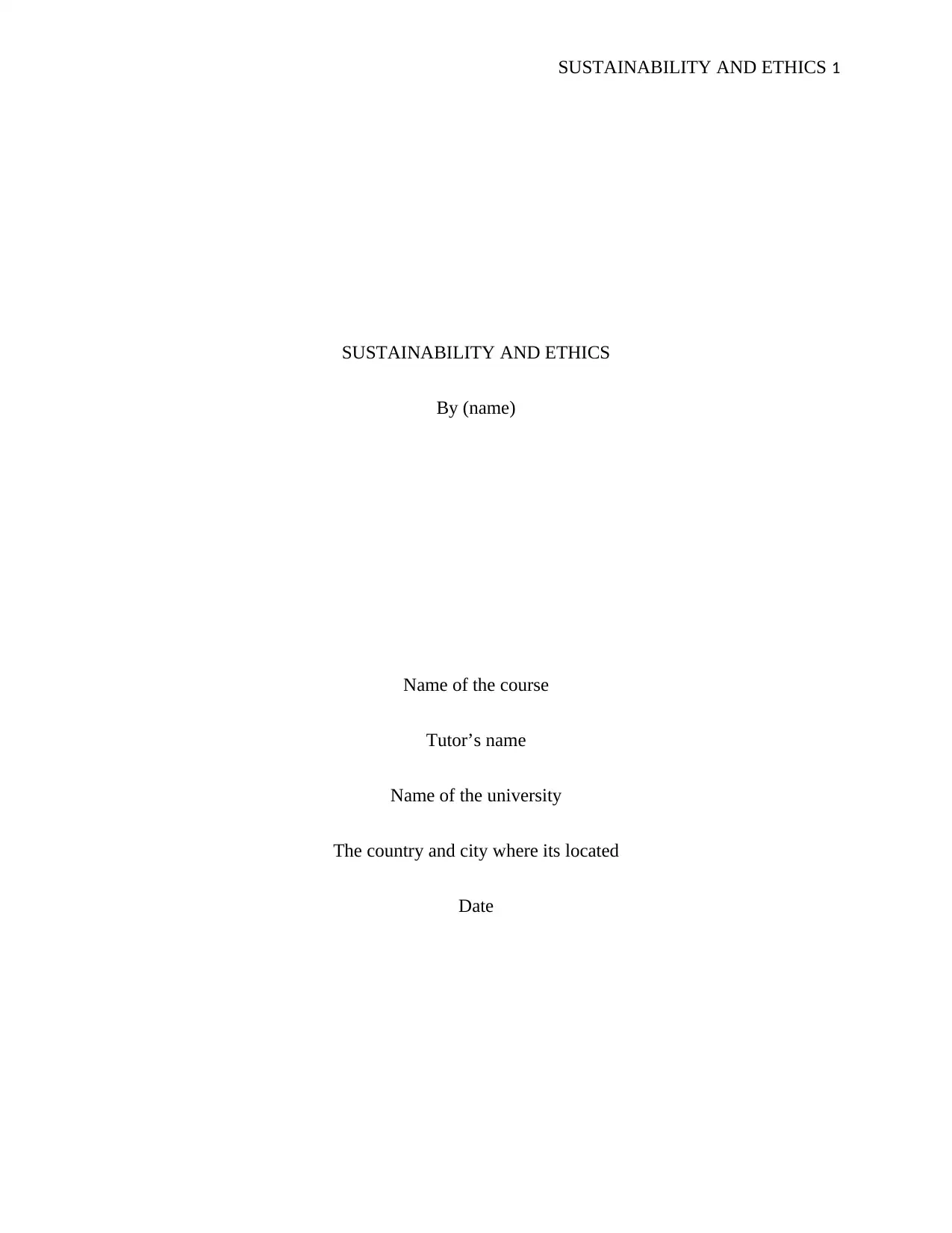
SUSTAINABILITY AND ETHICS 1
SUSTAINABILITY AND ETHICS
By (name)
Name of the course
Tutor’s name
Name of the university
The country and city where its located
Date
SUSTAINABILITY AND ETHICS
By (name)
Name of the course
Tutor’s name
Name of the university
The country and city where its located
Date
Paraphrase This Document
Need a fresh take? Get an instant paraphrase of this document with our AI Paraphraser
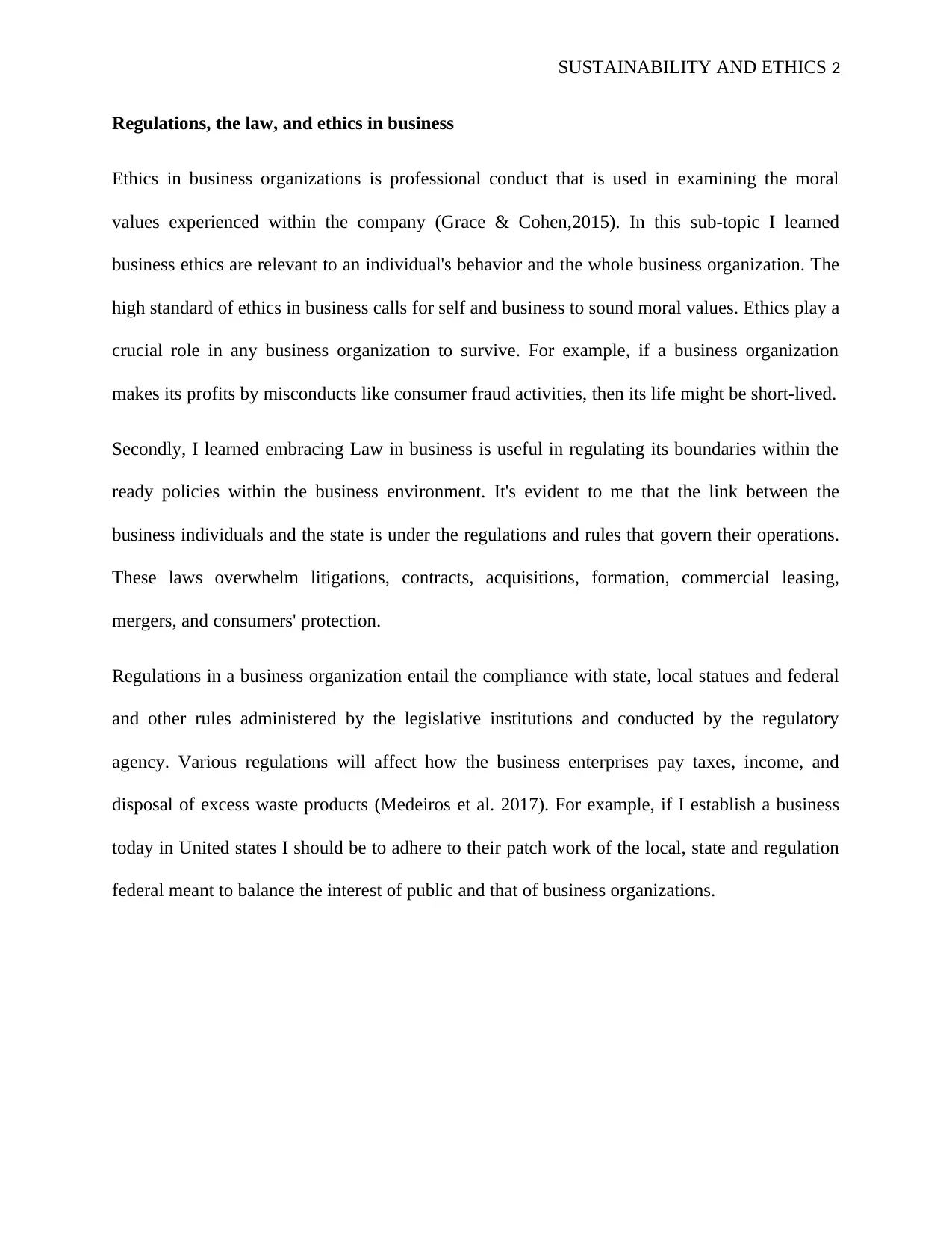
SUSTAINABILITY AND ETHICS 2
Regulations, the law, and ethics in business
Ethics in business organizations is professional conduct that is used in examining the moral
values experienced within the company (Grace & Cohen,2015). In this sub-topic I learned
business ethics are relevant to an individual's behavior and the whole business organization. The
high standard of ethics in business calls for self and business to sound moral values. Ethics play a
crucial role in any business organization to survive. For example, if a business organization
makes its profits by misconducts like consumer fraud activities, then its life might be short-lived.
Secondly, I learned embracing Law in business is useful in regulating its boundaries within the
ready policies within the business environment. It's evident to me that the link between the
business individuals and the state is under the regulations and rules that govern their operations.
These laws overwhelm litigations, contracts, acquisitions, formation, commercial leasing,
mergers, and consumers' protection.
Regulations in a business organization entail the compliance with state, local statues and federal
and other rules administered by the legislative institutions and conducted by the regulatory
agency. Various regulations will affect how the business enterprises pay taxes, income, and
disposal of excess waste products (Medeiros et al. 2017). For example, if I establish a business
today in United states I should be to adhere to their patch work of the local, state and regulation
federal meant to balance the interest of public and that of business organizations.
Regulations, the law, and ethics in business
Ethics in business organizations is professional conduct that is used in examining the moral
values experienced within the company (Grace & Cohen,2015). In this sub-topic I learned
business ethics are relevant to an individual's behavior and the whole business organization. The
high standard of ethics in business calls for self and business to sound moral values. Ethics play a
crucial role in any business organization to survive. For example, if a business organization
makes its profits by misconducts like consumer fraud activities, then its life might be short-lived.
Secondly, I learned embracing Law in business is useful in regulating its boundaries within the
ready policies within the business environment. It's evident to me that the link between the
business individuals and the state is under the regulations and rules that govern their operations.
These laws overwhelm litigations, contracts, acquisitions, formation, commercial leasing,
mergers, and consumers' protection.
Regulations in a business organization entail the compliance with state, local statues and federal
and other rules administered by the legislative institutions and conducted by the regulatory
agency. Various regulations will affect how the business enterprises pay taxes, income, and
disposal of excess waste products (Medeiros et al. 2017). For example, if I establish a business
today in United states I should be to adhere to their patch work of the local, state and regulation
federal meant to balance the interest of public and that of business organizations.
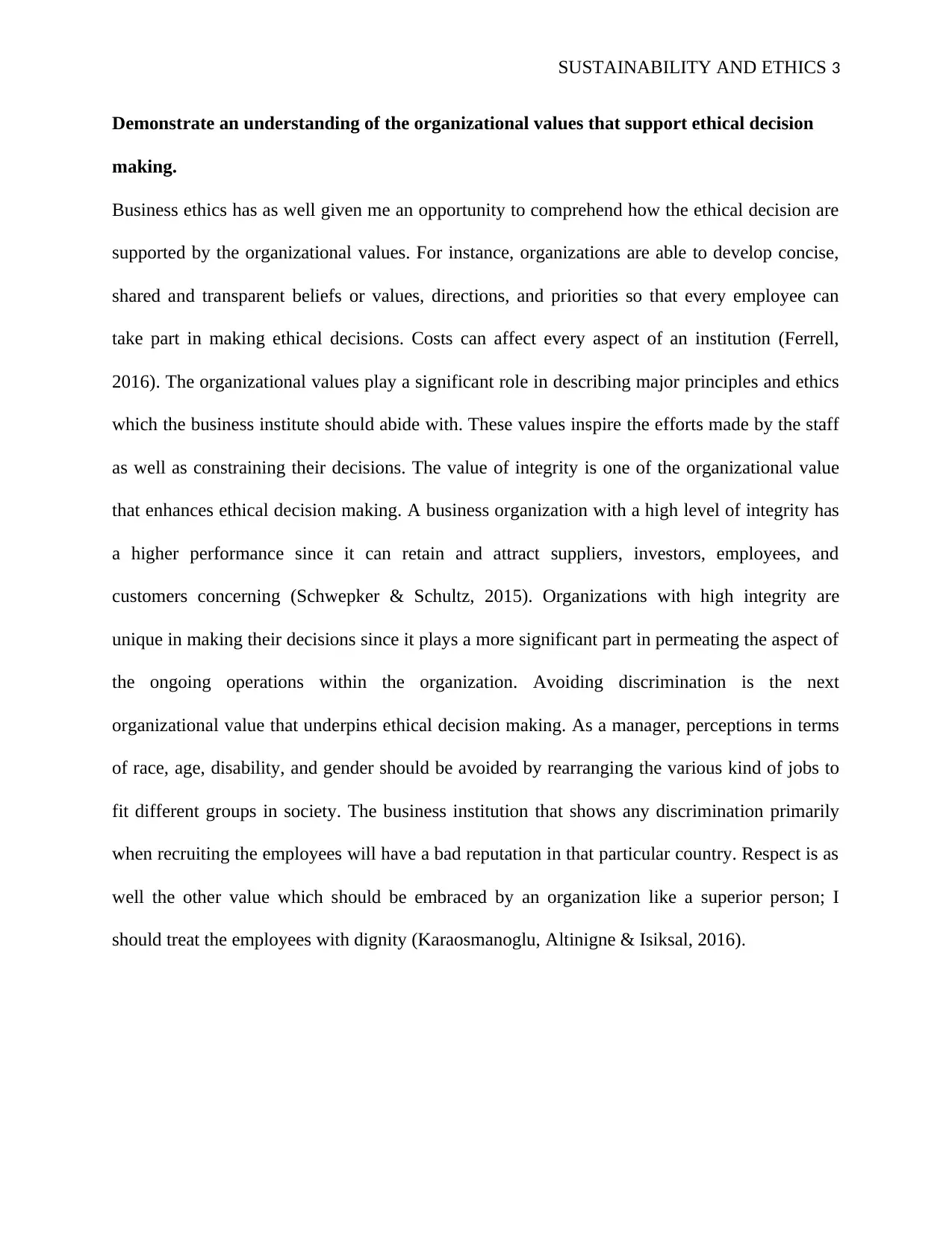
SUSTAINABILITY AND ETHICS 3
Demonstrate an understanding of the organizational values that support ethical decision
making.
Business ethics has as well given me an opportunity to comprehend how the ethical decision are
supported by the organizational values. For instance, organizations are able to develop concise,
shared and transparent beliefs or values, directions, and priorities so that every employee can
take part in making ethical decisions. Costs can affect every aspect of an institution (Ferrell,
2016). The organizational values play a significant role in describing major principles and ethics
which the business institute should abide with. These values inspire the efforts made by the staff
as well as constraining their decisions. The value of integrity is one of the organizational value
that enhances ethical decision making. A business organization with a high level of integrity has
a higher performance since it can retain and attract suppliers, investors, employees, and
customers concerning (Schwepker & Schultz, 2015). Organizations with high integrity are
unique in making their decisions since it plays a more significant part in permeating the aspect of
the ongoing operations within the organization. Avoiding discrimination is the next
organizational value that underpins ethical decision making. As a manager, perceptions in terms
of race, age, disability, and gender should be avoided by rearranging the various kind of jobs to
fit different groups in society. The business institution that shows any discrimination primarily
when recruiting the employees will have a bad reputation in that particular country. Respect is as
well the other value which should be embraced by an organization like a superior person; I
should treat the employees with dignity (Karaosmanoglu, Altinigne & Isiksal, 2016).
Demonstrate an understanding of the organizational values that support ethical decision
making.
Business ethics has as well given me an opportunity to comprehend how the ethical decision are
supported by the organizational values. For instance, organizations are able to develop concise,
shared and transparent beliefs or values, directions, and priorities so that every employee can
take part in making ethical decisions. Costs can affect every aspect of an institution (Ferrell,
2016). The organizational values play a significant role in describing major principles and ethics
which the business institute should abide with. These values inspire the efforts made by the staff
as well as constraining their decisions. The value of integrity is one of the organizational value
that enhances ethical decision making. A business organization with a high level of integrity has
a higher performance since it can retain and attract suppliers, investors, employees, and
customers concerning (Schwepker & Schultz, 2015). Organizations with high integrity are
unique in making their decisions since it plays a more significant part in permeating the aspect of
the ongoing operations within the organization. Avoiding discrimination is the next
organizational value that underpins ethical decision making. As a manager, perceptions in terms
of race, age, disability, and gender should be avoided by rearranging the various kind of jobs to
fit different groups in society. The business institution that shows any discrimination primarily
when recruiting the employees will have a bad reputation in that particular country. Respect is as
well the other value which should be embraced by an organization like a superior person; I
should treat the employees with dignity (Karaosmanoglu, Altinigne & Isiksal, 2016).
⊘ This is a preview!⊘
Do you want full access?
Subscribe today to unlock all pages.

Trusted by 1+ million students worldwide
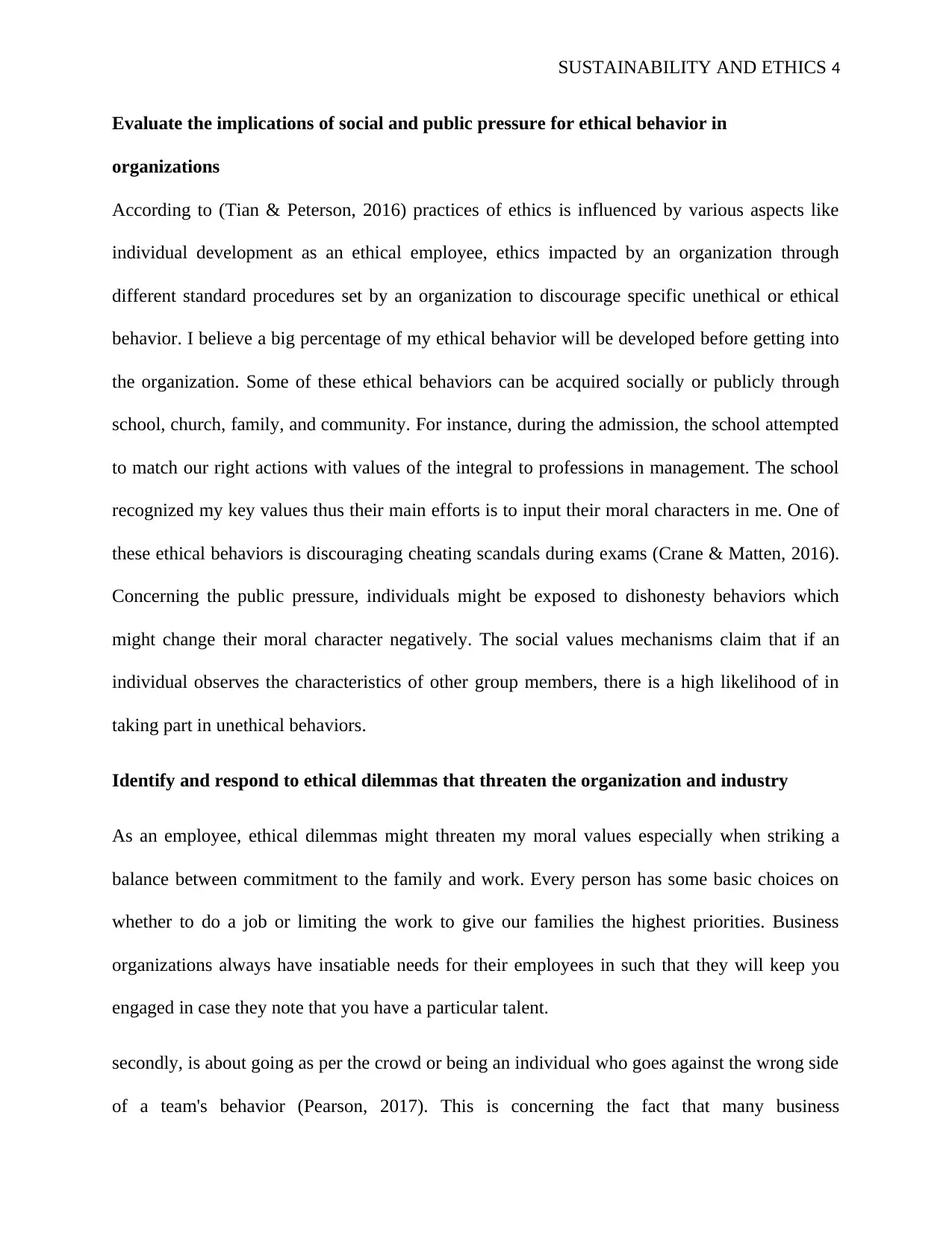
SUSTAINABILITY AND ETHICS 4
Evaluate the implications of social and public pressure for ethical behavior in
organizations
According to (Tian & Peterson, 2016) practices of ethics is influenced by various aspects like
individual development as an ethical employee, ethics impacted by an organization through
different standard procedures set by an organization to discourage specific unethical or ethical
behavior. I believe a big percentage of my ethical behavior will be developed before getting into
the organization. Some of these ethical behaviors can be acquired socially or publicly through
school, church, family, and community. For instance, during the admission, the school attempted
to match our right actions with values of the integral to professions in management. The school
recognized my key values thus their main efforts is to input their moral characters in me. One of
these ethical behaviors is discouraging cheating scandals during exams (Crane & Matten, 2016).
Concerning the public pressure, individuals might be exposed to dishonesty behaviors which
might change their moral character negatively. The social values mechanisms claim that if an
individual observes the characteristics of other group members, there is a high likelihood of in
taking part in unethical behaviors.
Identify and respond to ethical dilemmas that threaten the organization and industry
As an employee, ethical dilemmas might threaten my moral values especially when striking a
balance between commitment to the family and work. Every person has some basic choices on
whether to do a job or limiting the work to give our families the highest priorities. Business
organizations always have insatiable needs for their employees in such that they will keep you
engaged in case they note that you have a particular talent.
secondly, is about going as per the crowd or being an individual who goes against the wrong side
of a team's behavior (Pearson, 2017). This is concerning the fact that many business
Evaluate the implications of social and public pressure for ethical behavior in
organizations
According to (Tian & Peterson, 2016) practices of ethics is influenced by various aspects like
individual development as an ethical employee, ethics impacted by an organization through
different standard procedures set by an organization to discourage specific unethical or ethical
behavior. I believe a big percentage of my ethical behavior will be developed before getting into
the organization. Some of these ethical behaviors can be acquired socially or publicly through
school, church, family, and community. For instance, during the admission, the school attempted
to match our right actions with values of the integral to professions in management. The school
recognized my key values thus their main efforts is to input their moral characters in me. One of
these ethical behaviors is discouraging cheating scandals during exams (Crane & Matten, 2016).
Concerning the public pressure, individuals might be exposed to dishonesty behaviors which
might change their moral character negatively. The social values mechanisms claim that if an
individual observes the characteristics of other group members, there is a high likelihood of in
taking part in unethical behaviors.
Identify and respond to ethical dilemmas that threaten the organization and industry
As an employee, ethical dilemmas might threaten my moral values especially when striking a
balance between commitment to the family and work. Every person has some basic choices on
whether to do a job or limiting the work to give our families the highest priorities. Business
organizations always have insatiable needs for their employees in such that they will keep you
engaged in case they note that you have a particular talent.
secondly, is about going as per the crowd or being an individual who goes against the wrong side
of a team's behavior (Pearson, 2017). This is concerning the fact that many business
Paraphrase This Document
Need a fresh take? Get an instant paraphrase of this document with our AI Paraphraser
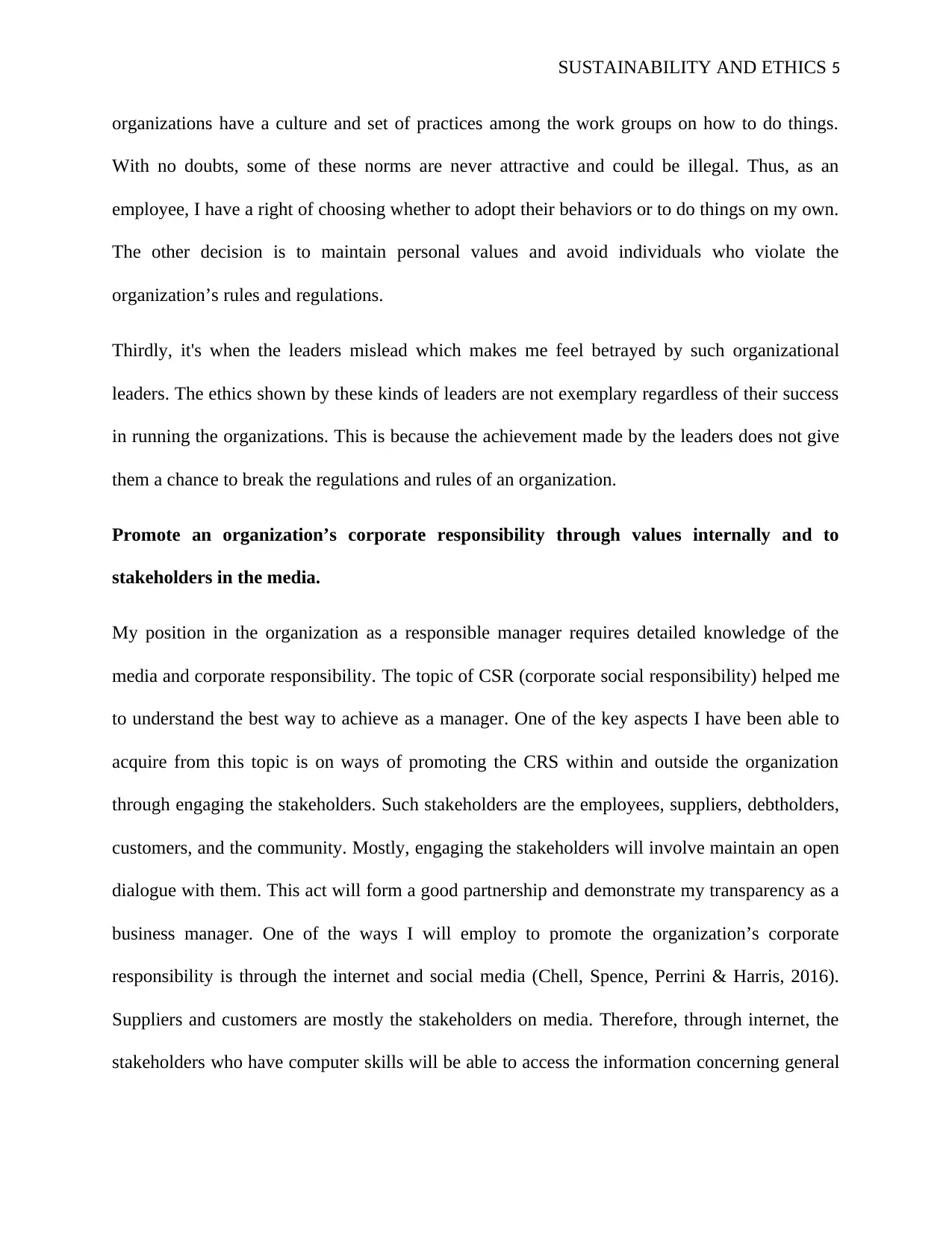
SUSTAINABILITY AND ETHICS 5
organizations have a culture and set of practices among the work groups on how to do things.
With no doubts, some of these norms are never attractive and could be illegal. Thus, as an
employee, I have a right of choosing whether to adopt their behaviors or to do things on my own.
The other decision is to maintain personal values and avoid individuals who violate the
organization’s rules and regulations.
Thirdly, it's when the leaders mislead which makes me feel betrayed by such organizational
leaders. The ethics shown by these kinds of leaders are not exemplary regardless of their success
in running the organizations. This is because the achievement made by the leaders does not give
them a chance to break the regulations and rules of an organization.
Promote an organization’s corporate responsibility through values internally and to
stakeholders in the media.
My position in the organization as a responsible manager requires detailed knowledge of the
media and corporate responsibility. The topic of CSR (corporate social responsibility) helped me
to understand the best way to achieve as a manager. One of the key aspects I have been able to
acquire from this topic is on ways of promoting the CRS within and outside the organization
through engaging the stakeholders. Such stakeholders are the employees, suppliers, debtholders,
customers, and the community. Mostly, engaging the stakeholders will involve maintain an open
dialogue with them. This act will form a good partnership and demonstrate my transparency as a
business manager. One of the ways I will employ to promote the organization’s corporate
responsibility is through the internet and social media (Chell, Spence, Perrini & Harris, 2016).
Suppliers and customers are mostly the stakeholders on media. Therefore, through internet, the
stakeholders who have computer skills will be able to access the information concerning general
organizations have a culture and set of practices among the work groups on how to do things.
With no doubts, some of these norms are never attractive and could be illegal. Thus, as an
employee, I have a right of choosing whether to adopt their behaviors or to do things on my own.
The other decision is to maintain personal values and avoid individuals who violate the
organization’s rules and regulations.
Thirdly, it's when the leaders mislead which makes me feel betrayed by such organizational
leaders. The ethics shown by these kinds of leaders are not exemplary regardless of their success
in running the organizations. This is because the achievement made by the leaders does not give
them a chance to break the regulations and rules of an organization.
Promote an organization’s corporate responsibility through values internally and to
stakeholders in the media.
My position in the organization as a responsible manager requires detailed knowledge of the
media and corporate responsibility. The topic of CSR (corporate social responsibility) helped me
to understand the best way to achieve as a manager. One of the key aspects I have been able to
acquire from this topic is on ways of promoting the CRS within and outside the organization
through engaging the stakeholders. Such stakeholders are the employees, suppliers, debtholders,
customers, and the community. Mostly, engaging the stakeholders will involve maintain an open
dialogue with them. This act will form a good partnership and demonstrate my transparency as a
business manager. One of the ways I will employ to promote the organization’s corporate
responsibility is through the internet and social media (Chell, Spence, Perrini & Harris, 2016).
Suppliers and customers are mostly the stakeholders on media. Therefore, through internet, the
stakeholders who have computer skills will be able to access the information concerning general
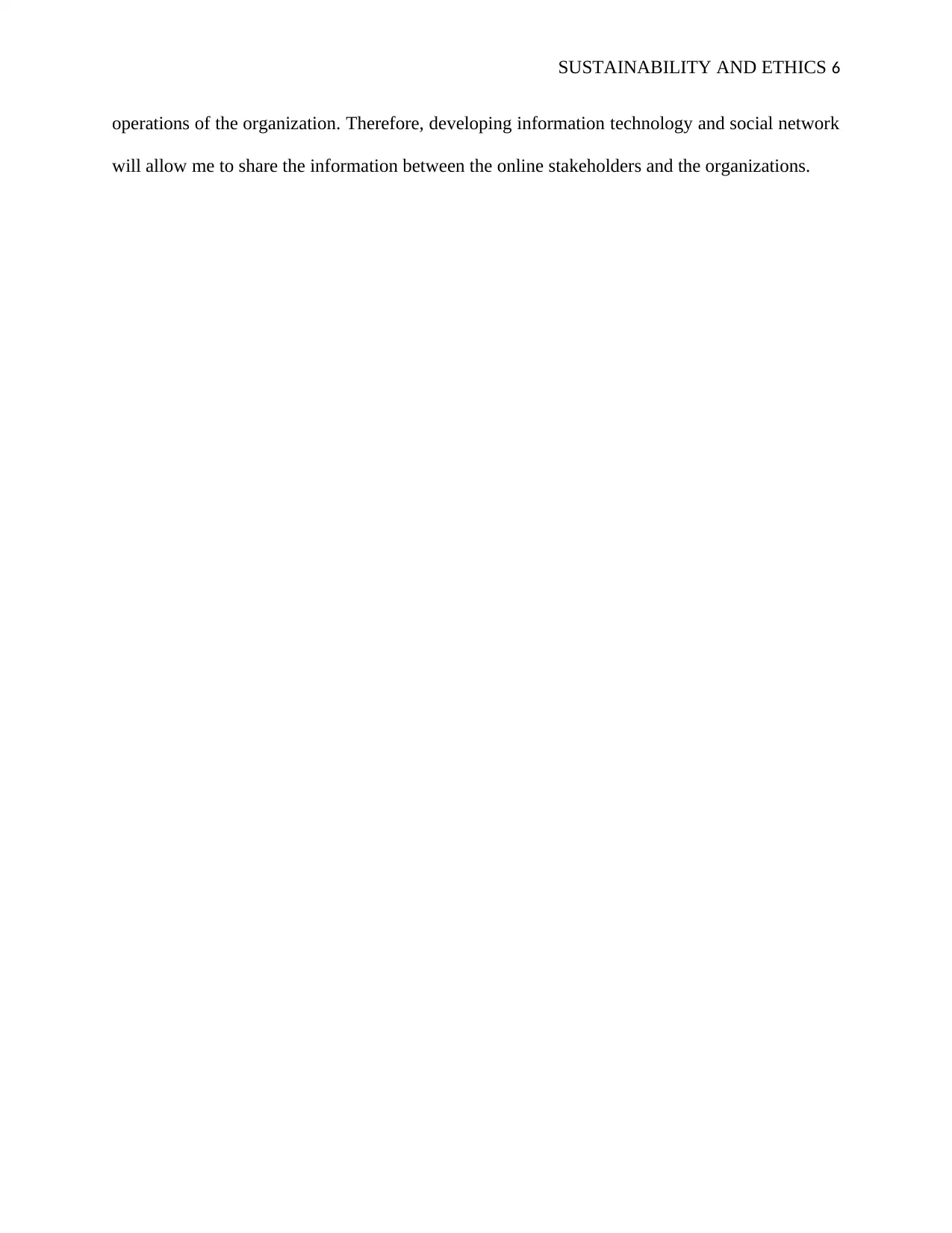
SUSTAINABILITY AND ETHICS 6
operations of the organization. Therefore, developing information technology and social network
will allow me to share the information between the online stakeholders and the organizations.
operations of the organization. Therefore, developing information technology and social network
will allow me to share the information between the online stakeholders and the organizations.
⊘ This is a preview!⊘
Do you want full access?
Subscribe today to unlock all pages.

Trusted by 1+ million students worldwide

SUSTAINABILITY AND ETHICS 7
References
Chell, E., Spence, L. J., Perrini, F., & Harris, J. D. (2016). Social entrepreneurship and business
ethics: Does social equal ethical?. Journal of business ethics, 133(4), 619-625.
Crane, A., & Matten, D. (2016). Business ethics: Managing corporate citizenship and
sustainability in the age of globalization. Oxford University Press.
Ferrell, O. C. (2016). A framework for understanding organizational ethics. In Business ethics:
New challenges for business schools and corporate leaders (pp. 15-29). Routledge.
Grace, D., & Cohen, S. (2015). Business ethics. Oxford: Oxford University Press. ISBN:
9780195519549
Karaosmanoglu, E., Altinigne, N., & Isiksal, D. G. (2016). CSR motivation and customer extra-
role behavior: Moderation of ethical corporate identity. Journal of Business Research,
69(10), 4161-4167.
Medeiros, K. E., Watts, L. L., Mulhearn, T. J., Steele, L. M., Mumford, M. D., & Connelly, S.
(2017). What is working, what is not, and what we need to know: A meta-analytic review
of business ethics instruction. Journal of Academic Ethics, 15(3), 245-275.
Schwepker, C. H., & Schultz, R. J. (2015). Influence of the ethical servant leader and pleasant
climate on customer value enhancing sales performance. Journal of Personal Selling &
Sales Management, 35(2), 93-107.
Tian, Q., & Peterson, D. K. (2016). The effects of ethical pressure and power distance orientation
on unethical pro‐organizational behavior: the case of earnings management. Business
Ethics: A European Review, 25(2), 159-171.
References
Chell, E., Spence, L. J., Perrini, F., & Harris, J. D. (2016). Social entrepreneurship and business
ethics: Does social equal ethical?. Journal of business ethics, 133(4), 619-625.
Crane, A., & Matten, D. (2016). Business ethics: Managing corporate citizenship and
sustainability in the age of globalization. Oxford University Press.
Ferrell, O. C. (2016). A framework for understanding organizational ethics. In Business ethics:
New challenges for business schools and corporate leaders (pp. 15-29). Routledge.
Grace, D., & Cohen, S. (2015). Business ethics. Oxford: Oxford University Press. ISBN:
9780195519549
Karaosmanoglu, E., Altinigne, N., & Isiksal, D. G. (2016). CSR motivation and customer extra-
role behavior: Moderation of ethical corporate identity. Journal of Business Research,
69(10), 4161-4167.
Medeiros, K. E., Watts, L. L., Mulhearn, T. J., Steele, L. M., Mumford, M. D., & Connelly, S.
(2017). What is working, what is not, and what we need to know: A meta-analytic review
of business ethics instruction. Journal of Academic Ethics, 15(3), 245-275.
Schwepker, C. H., & Schultz, R. J. (2015). Influence of the ethical servant leader and pleasant
climate on customer value enhancing sales performance. Journal of Personal Selling &
Sales Management, 35(2), 93-107.
Tian, Q., & Peterson, D. K. (2016). The effects of ethical pressure and power distance orientation
on unethical pro‐organizational behavior: the case of earnings management. Business
Ethics: A European Review, 25(2), 159-171.
Paraphrase This Document
Need a fresh take? Get an instant paraphrase of this document with our AI Paraphraser

SUSTAINABILITY AND ETHICS 8
1 out of 8
Related Documents
Your All-in-One AI-Powered Toolkit for Academic Success.
+13062052269
info@desklib.com
Available 24*7 on WhatsApp / Email
![[object Object]](/_next/static/media/star-bottom.7253800d.svg)
Unlock your academic potential
Copyright © 2020–2026 A2Z Services. All Rights Reserved. Developed and managed by ZUCOL.




